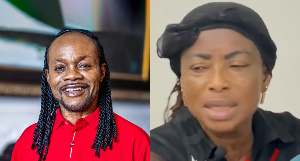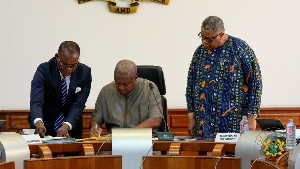Professor George Ayittey, an Economist and lecturer at the American University in the United States has observed that Ghana's economy which was in coma and on life-support under Jerry Rawlings is showing signs of regaining consciousness.
"After just eight months of President Kufuor in office, I can confidently assert that things are moving in the right direction," Ayittey who is also President of the Free Africa Foundation in Washington DC, told Journalists yesterday at a briefing at the Institute of Economic Affairs.
Prof. Ayittey was diagnosing the economy under Kufuor's eight-month administration vis-?-vis Jerry Rawlings' 19- year rule.
He said under Kufuor, the value of the cedi has stabilised; now trading at ?6,900 to the dollar, instead of the ?7,200 under Rawlings. Interest rates have dropped, although slightly from 47% to 44%. The rate of inflation has dropped to 36%, although the cost of living remains high.
Prof. Ayittey was delighted that in the first quarter of this year, more than 38 investment projects, worth more than $45 million were initiated in the country. Within the same period, Ghanaians abroad have demonstrated a renewed commitment to return home and help build the economy.
According to him, the upswing in economic activity under President Kufuor is in sharp contrast with the long tenure of Jerry Rawlings. Under Rawlings, inflation was more than 60%, unemployment exceeded 30%, interest rates hovered around 47 and, "the cedi was virtually worthless, requiring ?7,200 to exchange for one dollar."
These figures were impressive enough for Prof. Ayittey to rate the NPP government above the P(NDC). "So far so good, but we have other areas we need to do more if we are to turn the economy around."
He said the first area Ghanaians need to critically look at is the abnormally high expectation the public has from the government. "We cannot realistically expect the Kufuor government to perform an economic miracle and turn the economy around after barely eight months in office. It takes time to initiate projects, employ people and to produce goods", he noted and urged Ghanaians not to fold their hands and expect the government solve all the country's problems.
Another area of concern to him is the state of the country's institutions, such as the judiciary, the civil service, the media, the educational system, the health system, the security forces, the Electoral Commission and the banking system among others. These, he said have been allowed to decay or perverted to serve the whims of Jerry Rawlings and his cronies in the past 19 years. He said there was a complete breakdown of professionalism in the Armed Forces and other security services. The military violated its "military code" by allowing itself to be politicised, the Civil Service did not follow its own code, leaving no distinction between government functions and party functions. And the educational system sank so low that Rawlings and his ministers withdrew their children from local schools to schools overseas.
He pointed out that the above institutions are the pillars of democracy and advocated a rigorous cleansing of these institutions, without which the government would make little progress.
He also urged the government to strengthen local institutions at the districts to enable them to implement their own projects. This would reduce the national budget and reduce corruption in the award of contracts. He urged the media to establish their independence by resisting any encroachment on their turf, no matter how beguiling the advances may be.
One other area Prof. Ayittey wants to be revamped is wealth creation. He explained that in the developed world, wealth is created in the private sector, but is exactly the opposite in Africa. Using Bill Gates, the richest man in the world as an example, he said the man made his fortune of $60 billion in the private sector. By contrast, the richest people in Ghana and Africa are Heads of State and ministers, who use the government machinery to extract wealth from ordinary people. He said this scenario explains why every educated African wants to enter politics and become president. Abacha, Mobuto, Rawlings, Iddi Amin, Emperor Bukasa, Samuel Doe etc., easily fall into this category.
"If the African elite were to seek their wealth in the private sector, both Africa and the elite would reap immense benefits."
On the strength of the above, Prof Ayittey admonished Ghanaian elite not to go to President Kufuor with their CVs, but seek their wealth in the private sector. More so, when the government has lived up to its promise to make the private sector the engine of growth.
"I believe that if we pay attention to these structures, Ghana, under President Kufuor will deliver the country to the elusive 'Promised Land'."
General News of Wednesday, 15 August 2001
Source: Accra Mail
Economy Up From Coma -Ayittey
Entertainment











